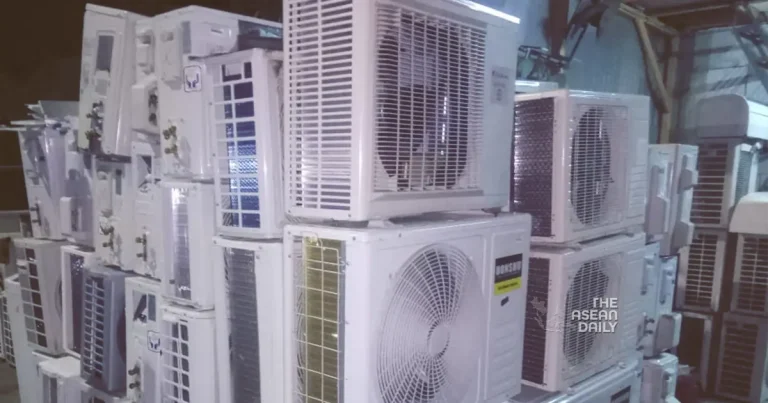18-11-2023 (JAKARTA) Riki, an air-conditioner technician, is experiencing a surge in business due to the scorching temperatures in Indonesia. In the past two months alone, his daily workload has doubled, with up to 12 customers seeking his services. The extended dry season has caused temperatures to soar, reaching almost 40 degrees Celsius in certain areas, such as South Tangerang in the Greater Jakarta metropolitan region. As a result, Riki’s income has doubled, bringing him much-needed relief and happiness.
Air-conditioners play a crucial role in providing comfort for Indonesians and other tropical regions during hot spells. However, recent research conducted by the non-governmental organization CLASP has revealed that the majority of air-conditioners purchased in Southeast Asia are energy inefficient. These appliances not only consume excessive energy but also contribute to climate change due to the presence of refrigerants with high global warming potential. This situation places additional strain on national energy grids and burdens consumers with higher energy bills.
Experts have warned that unless the government takes strict measures, Indonesia will remain a dumping ground for non-efficient air-conditioners. The term “dumped air-conditioners” refers to products that do not meet the minimum energy performance standards (MEPS) in their countries of origin but are exported to regions with less stringent regulations.
CLASP conducted a study across Indonesia, Malaysia, the Philippines, Singapore, Thailand, and Vietnam, examining the sale of inefficient room air-conditioners. The research found that out of the 8.3 million units sold in these countries in 2021, approximately 6.2 million units, or three out of four, were considered low efficiency. Indonesia and the Philippines were the most affected, with 97% and 78% of room air-conditioners sold in these countries, respectively, being deemed inefficient. Malaysia, Thailand, and Vietnam had rates around 60%, while Singapore fared slightly better with 21% of sales consisting of low-efficiency models.
According to Ms. Lina Kelpsaite, CLASP’s manager from the climate team in Washington, DC, Indonesia has the least efficient market among the six countries studied. The reasons behind this inefficiency were not extensively examined, but it is believed that demand for less expensive air-conditioners, which tend to be less energy efficient, plays a role. Indonesia’s diverse population with varying purchasing power also contributes to this situation. While the manufacturing countries have higher MEPS, some air-conditioners still qualify for sale in Indonesia.
In 2017, the Indonesian Ministry of Energy and Mineral Resources introduced a regulation mandating energy-saving marks on domestic and imported air-conditioners. These labels range from one to four stars, with four stars indicating the highest energy efficiency. However, during a visit to several electronic shops in Jakarta, we discovered air-conditioners without any label. The prices also varied significantly, with units lacking labels priced at around 1.8 to 2 million rupiah, while those with two stars cost approximately 3 million rupiah. Models with four stars were priced above 5 million rupiah.
The majority of brands supplying inefficient air-conditioners to Southeast Asia are multinational companies headquartered in China, South Korea, Japan, and the United States. Although most of the air-conditioners sold in the region are produced locally, nearly 30% of the inefficient units are imported from outside Southeast Asia. China accounts for the largest portion, with about 93% of its exports failing to meet efficiency requirements. South Korea and Japan also contribute to the problem, with 59% and 21% of their exports respectively falling short of their own countries’ standards.
Aside from the negative environmental impact, energy-guzzling air-conditioners exacerbate carbon emissions in Indonesia, where the majority of electricity is generated from climate-warming fossil fuels. CLASP’s report indicates that if the six countries studied banned the dumping of inefficient air-conditioners, they could collectively reduce over 1 billion metric tons of carbon dioxide emissions over 25 years, resulting in savings of US$148 billion for consumers. Such efforts would also contribute significantly to Indonesia’s climate targets, as the country currently ranks as the world’s ninth-largest emitter, with energy sector emissions totaling around 600 million tonnes of carbon dioxide in 2021.
By investing in more efficient air-conditioners, Indonesian consumers can potentially save approximately US$846 in eight years, offsetting the higher initial price. This estimate, provided by CLASP, compares the most commonly available air-conditioner unit in Indonesia with a model that nearly meets China’s current efficiency requirements. The calculation is based on Indonesia’s current electricity tariff of approximately US$0.10/kWh and considers air-conditioner models with comparable capacities and features.
Mr. Ahmad Ashov Birry, the program director at the Jakarta-based NGO Trend Asia, stresses the importance of energy efficiency in reducing greenhouse gas emissions and addressing the climate crisis. He urges the Indonesian government to increase supervision and enforce existing regulations regardingenergy efficiency standards for air-conditioners. Birry also suggests that the government consider implementing stricter regulations and providing incentives for the production and purchase of energy-efficient appliances.
To address the issue, CLASP recommends a multi-stakeholder approach involving governments, manufacturers, retailers, and consumers. They propose that governments establish and enforce stringent energy efficiency standards, ban the import and sale of inefficient air-conditioners, and provide incentives for the production and purchase of energy-efficient models. Manufacturers should invest in research and development to improve the energy efficiency of their products and label them accordingly. Retailers can play a role by promoting and prioritizing the sale of energy-efficient air-conditioners. Lastly, consumers should be educated about the benefits of energy efficiency and encouraged to make informed choices when purchasing appliances.
The rising demand for air-conditioners in Indonesia and the wider Southeast Asian region presents an opportunity to address energy efficiency and climate change concerns. By taking decisive action, governments, manufacturers, retailers, and consumers can work together to promote the use of energy-efficient air-conditioners, reduce carbon emissions, and mitigate the impact of climate change.




